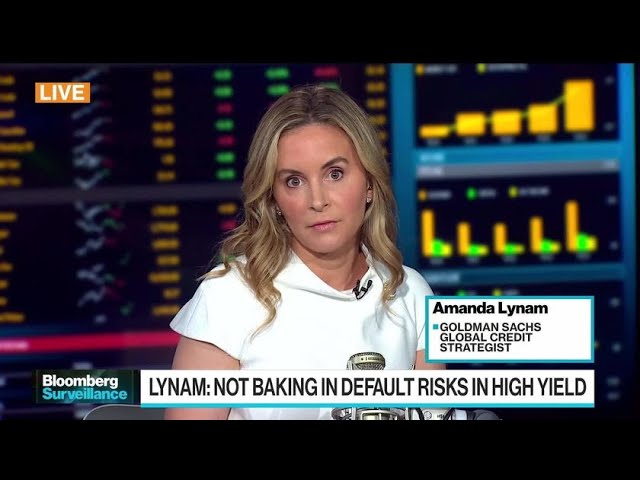How much are we losing right now with The aggregate index down 10 plus good Morning tom thanks for having me so a Couple of weeks ago we talked about how Both ig and high yield total returns Were off to their worst start on record So it's been a very very painful year i Think the key risk for bond investors in Our view is that that's been entirely Driven almost by the rates component and Spreads have held in very well so in the Event that we do get a recession which Is not our economist-based case but if We did get one there's a lot more room For spreads to widen and kind of even Exacerbate those losses that we've Already recorded year-to-date and so That is that is one of the key risks to To the market what a quota ig investment Grade old style bonds i want to buy a General motors bond it's a part of the Aggregate index What do you do where equity people say I'm going to go to cash or you know i Think there's a there's a dialogue about What equity people do what do bond People do when they quote unquote want To go to cash yeah they they often move Up in quality or shorten duration but One of the risks that we've highlighted In our recent research is that actually Moving too far up the quality spectrum In ig also has its risks because those Are the companies that are likely to
Move ahead with say debt funded m a or Aggressive shareholder returns Irrespective of the slowing economy and So we actually like within ig that sweet Spot of triple b rated firms those are Companies that we believe are committed To staying investment grade but are Likely going to behave in a more Conservative fashion relative to say They're highly rated peers cash rich Pharma and tech companies for example That will do m a regardless of the Backdrop amanda where are we in terms of What we're pricing into the credit Market right now initially you talk About the worst start of the year ever That was largely due to rates that was Not due to the extra cushion of yields That accounts for potential defaults now We're shifting into something else we're Starting to see that widen out how far In that process are we that's right so We have not priced in a lot of default Risk and specifically kind of zooming in On the high-yield market and we do think That that's probably appropriate at this Stage so just to set the backdrop our Economists are not expecting a recession As their base case this year and what We've said is that even if we do have a Downturn and growth slows substantially The high-yield market is unlikely to Experience the uptick in defaults that We're kind of used to seeing in previous
Cycles there are a few reasons for that One is just we didn't have a default Cycle that long ago right so in 2020 we Had a lot of the weaker firms cleaned Out of the high-yield market Energy and metals and mining and kind of Natural resources are also in a much Better position now relative to previous Cycles and those are historically the Vulnerable sectors and and then also we Have a lot of cash on hand and balance Sheets are very strong so um to answer Your questions specifically we're not Baking in a lot of default risk in the High-yield market right now Based on current spreads of 450 But that's that's probably not Inappropriate given the i would say the Higher quality and the increased Strength of the high yield market Movement amanda a lot of people would Agree with you and we see this note After note basically even if we get a Recession things don't have to get that Bad in credit because people have pushed Out their maturity so far and because There was this washout what does that Mean in terms of how high the fed can go With the fed funds rate before we have a Real problem in credit which is really The market that the fed watches and Potentially would respond to not equity Is having a bad day right exactly so our Economists expect a terminal value of
Three to three and a quarter percent a Large amount of that is already Reflected in fed fund sutures for Example and baked into the market i Think there's a lot of room to go for Financial conditions to to tighten and Really for the fed to deliver on the Hikes that are already priced in to the Market and i think credit investors are Expecting that Really the key risk for credit is if we Had a freezing up of the primary market Activity such that corporates if they Wanted to access the debt markets could Not right now we're we're actually Saying that a lot of the muted supply Volumes are due to an unwillingness to Access the market on the on the side of Corporates as opposed to an inability And it goes back to exactly what you Mentioned corporates have the luxury of Being patient they spent most of 2020 And 2021 raising cash pre-funding years In advance and so they're not really at The whim of the market in terms of of Having to execute in a choppy conditions I know jonathan talked about this on on Friday afternoon on his program but Really on those windows of stability You're seeing a lot of activity and we Think that's indicative of a market That's still remaining open






